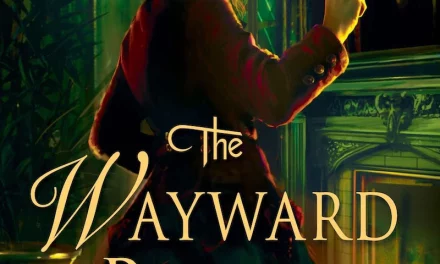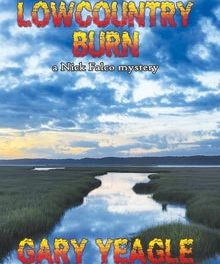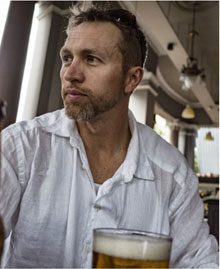 Mark Powell may be southern literature’s best kept secret – but not for long.
Mark Powell may be southern literature’s best kept secret – but not for long.
By Margaret Evans, Editor
Mark Powell is one of my favorite mysteries.
I discovered Mark through his novel The Sheltering, published by Pat Conroy’s Story River Books in 2014. I was working as Pat’s assistant at the time, and we both thought Mark’s manuscript was nothing short of brilliant. Moody, complicated, and deeply disturbing, it rang with the dissonant harmonies of a profound new southern voice. Except it wasn’t new. The Sheltering was Mark’s fourth novel.
“Where’s this guy been all my life?” I remember Pat asking as we sat on his porch discussing this great find. (Nothing thrilled Pat more than stumbling on a terrific new writer.) I wondered the same thing, and the unnerving beauty of The Sheltering haunted me for months.
Then I met Mark. He was in Beaufort for the ‘Pat Conroy at 70’ Festival, and to say he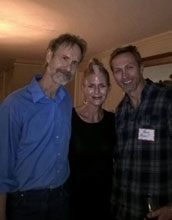 defied my expectations is a gross understatement. Based on his writing, I’d imagined this intense, brooding character - kind of James Dean meets Al Pacino - but what I encountered, instead, was a lanky sunflower of a guy, with with an easy smile and a sweet disposition. He was back last year for the Pat Conroy Literary Festival, and again, I marveled at the mystery. How did the dark universe of The Sheltering spring from the mind of this affable boy-next-door?
defied my expectations is a gross understatement. Based on his writing, I’d imagined this intense, brooding character - kind of James Dean meets Al Pacino - but what I encountered, instead, was a lanky sunflower of a guy, with with an easy smile and a sweet disposition. He was back last year for the Pat Conroy Literary Festival, and again, I marveled at the mystery. How did the dark universe of The Sheltering spring from the mind of this affable boy-next-door?
And now comes book #5, Small Treasons. Not only does it deepen that mystery, but it confirms my original opinion that Mark Powell belongs in the pantheon of great southern writers.
Suspense novel . . . political thriller . . . psychological study . . . philosophical treatise . . . theological meditation . . . Small Treasons is all, and none, of the above. Ron Rash (Serena) calls it a “marvelous novel” about “Americans searching for meaning in a violent, fragmented world.” James Scott (The Kept) says, “Though Powell tackles some of the big questions of our time, this is the story of people, characters who are startlingly real, and the secrets and misunderstandings that keep happiness just out of reach.”
From poor rural Georgia to the posh Florida suburbs, from a politically-charged college campus to a secret ISIS training camp, Small Treasons leads us through shadowy terrain – both familiar and unfamiliar – where its flashes of light dazzle. The novel is nothing if not timely and relevant, yet it feels weighty and enduring, too, resonating with eternal themes, woven together in prose so fine it often reads like poetry.
The author has received fellowships from the National Endowment for the Arts and the Breadloaf and Sewanee Writers’ Conferences, was a Fulbright Fellow to Slovakia in 2014, and received the Chaffin Award for contributions to Appalachian literature in 2009. He’s a graduate of the Citadel, the University of South Carolina, and Yale Divinity School – a rare combination that may help account for the breadth and depth of his vision. But as far as I can tell, it’s mostly just a gift. A mystery.
Mark Powell is heading back to Beaufort in August, where he’ll appear in conversation with his fellow Citadel grad and Story River Books author John Warley (A Southern Girl), as part of the Pat Conroy Literary Center’s Visiting Writers Series.
I recently had the pleasure of interviewing Mark for the Conroy Center’s Porch Talk blog. As always, he was impeccably nice.
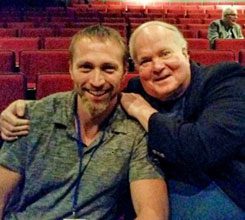 ME: Mark, you’ve dedicated your new book to Pat Conroy. What did he mean to you?
ME: Mark, you’ve dedicated your new book to Pat Conroy. What did he mean to you?
MP: Pat meant far more to me than I could ever convey. When I was in high school, his books opened the door onto a larger world, one that I knew intuitively existed even if I couldn’t find it.
ME: In 2015, you wrote in Lowcountry Weekly, “I read The Lords of Discipline riding back and forth to away basketball games my junior year of high school. A senior had given it to me - he was headed to the Air Force Academy after graduation - saying only, “I think you’ll get it.” I did get it, whatever – ‘it’ was. But more importantly I think it got me. I was a not quite bookish kid living a very unbookish life. But after reading Pat Conroy the first time I began to understand there was a larger world I could read my way into.”
MP: Right. And when I got to know him I found that for all his powers as a writer (and they were great), he was an even better human being. His generosity, his kindness, his humility – reading Pat was a master class in storytelling. But knowing him was a master class in being alive.
ME: In Small Treasons, your protagonist John Maynard is a small town southern boy turned academic - a scholar of theology who’s now working as a counselor at a liberal arts college in the Georgia mountains. He describes himself as an “over-educated good ol’ boy, a Bible Belt scripture whiz gone rogue.” You grew up in a small southern town, have a graduate degree from Harvard Divinity School, and teach English at Appalachian State University. Is the character of John Maynard based on anybody you know? (Ha!)
MP: I’m laughing here too. Certainly there are parts of me in all my characters, but particularly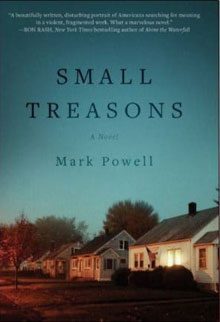 in John Maynard. We share a lot of backstory. Obviously, John has done things in his past I haven’t. But he is riddled by guilt and to some degree I suppose I am too. Not for what I’ve done; it’s a collective guilt, I think, part of being an angry but ultimately apathetic American during the Bush years. That may not be logical but it is certainly there.
in John Maynard. We share a lot of backstory. Obviously, John has done things in his past I haven’t. But he is riddled by guilt and to some degree I suppose I am too. Not for what I’ve done; it’s a collective guilt, I think, part of being an angry but ultimately apathetic American during the Bush years. That may not be logical but it is certainly there.
ME: In Small Treasons, you show us a world of small towns in economic decline . . . failing Evangelical mega-churches . . . kind-hearted, God-fearing conservatives . . . functioning drug addicts. Some readers might recognize these people as “deplorables” - the white working class and rural poor who’ve been endlessly analyzed since the election of Donald Trump. Care to comment?
MP: What’s happening to our country is scary, but it’s not surprising. I find the racism, the misogyny, the fear generated by Trump and so much of the far-right to be disgusting. It is America - which I love dearly, and still believe in – at our absolute worst. But you can’t denigrate people with impunity, mocking their culture, shipping their jobs overseas, and not expect an angry reaction.
ME: Your portrait of a young Atlanta man who becomes radicalized by jihadist ideology is particularly riveting. You bring the same sensitivity, complexity, and unflinching humanity to this portrait as you do to your portraits of rural Americans, progressive academics, suburban housewives, etc. I assume you know plenty of those, but how did you research the character of the young jihadist-in-training?
MP: Thank you for saying that. I read a great deal about the process of radicalization. But more than that I tried to think about what it feels like when you’re young and more than anything you want to matter, to know that you belong to something larger. The heat of that fire makes life malleable, and it isn’t difficult for a young person, particularly a young man in a culture he is coming to understand as corrupt, to be himself corrupted. I imagine the same desire that leads to heroic acts of idealism is at base not that different from what animates a suicide bomber.
ME: Ron Rash calls your book “a beautifully written, disturbing portrait of Americans searching for meaning in a violent, fragmented world.” It occurs to me that many of your characters seem to find spiritual meaning - “clarity,” they often call it – in pushing themselves to physical extremes. They are runners and fighters and weight lifters . . . You’re an athlete, yourself. Do you see this extreme physical exertion as a kind of religion?”
MP: I think extreme exercise has always been a form of spiritual practice for me, even before I had any conception of such. So much of the world seeks to disembody us - online personas, screens, talking to each other without ever actually “talking.” But we live in bodies – thank God - and one of the things that reminds us of such, that grounds us, is feeling the body pushed to its limits. If running for hours or lifting weights to exhaustion isn’t a form of prayer I suppose I don’t know what is.
***
Mark Powell will be in conversation with John Warley (A Southern Girl) on Sunday, August 6th from 3:30 – 5 pm in the TCL auditorium (building 12) in Beaufort. Books will be available for purchase and autographing thanks to NeverMore Books. This event is FREE and open to the public. For more information visit www.patconroyliterarycenter.org
Margaret Evans is the editor of Lowcountry Weekly. Read her regular column Rants & Raves or visit her blog at www.memargaret.com



